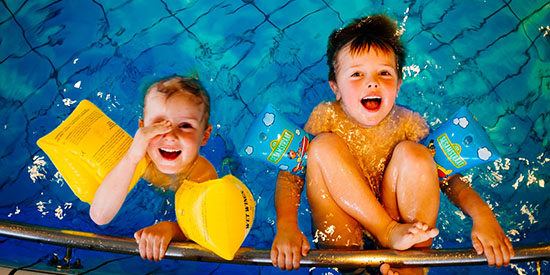Swimming pool kiosks the latest target in war on obesity
Media releaseA new Deakin University study shows almost all the food and drink children consume from swimming pool kiosks is classified in the most unhealthy range.
The new research found that despite being located in a health-promoting setting, food retail within aquatic and recreation centres was often nutritionally poor.
Lead researcher Tara Boelsen-Robinson, from Deakin's Global Obesity Centre in the School of Health and Social Development, said the study surveyed 2,226 visitors at four of Melbourne's largest aquatic centres, and found junk food made up 92 percent of what children consumed from the onsite kiosk.
"These summer holidays, for most kids, a trip to the local swimming pool is often associated with a visit to the tuckshop," Ms Boelsen-Robinson said.
"Ice creams, lemonade or hot chips often follow an afternoon of splashing about. But we know that when it comes to maintaining a healthy weight, a good diet is just as important as regular exercise.
"With children’s swimming lessons being offered at these four pools each week, improving the nutritional quality of the food in the cafe has the potential to significantly reduce these kids' exposure to, and consumption of, unhealthy options."
Deakin University is currently working with sports and recreation providers including YMCA Victoria, the state's largest provider of community recreation, to build the evidence to dramatically reduce the junk food sold at aquatic and recreation centres.
YMCA Victoria has introduced a Healthy Food and Beverage Policy that aims to reduce unhealthy food and drink and increase healthy options, including the removal of soft drinks from sale at its 70 outlets, which has so far had some surprising results.
While soft drink sales were lost, a Deakin-led study found the kiosks' bottom lines were unchanged as overall beverage sales remained the same.
"YMCA Victoria would sell approximately 347,000 units of soft drink each year, which equates to close to 14 tonnes of sugar," said Ariana Kurzeme, YMCA Victoria's Advocacy Manager.
"This is a staggering amount of sugar and after examining the food and drinks we were selling in our centres we knew we had to make some significant changes.
"By removing soft drinks from sale, reducing junk food and providing healthier options, we saw a chance to promote healthy eating and improve the health of the communities we work with."
Professor Anna Peeters, also from Deakin's Global Obesity Centre, said removing sugary drinks was an important first step in addressing Australia's "alarming" rates of obesity, with more than a quarter of Australian adults now classified as obese and 7 per cent of children.
"It's estimated that 10 per cent of Australia's obesity problem can be attributed to sugar-filled drinks alone," Professor Peeters said.
"It makes sense that organisations with connections to children, sport and health, are exploring ways to reduce sugary drink consumption."
"This isn't an isolated initiative either, it's a reflection of the community's growing understanding that sugar-sweetened beverages have no place in our daily diet."
'Examining the nutritional quality of food and beverage consumed at Melbourne aquatic and recreations centres' was published in the Australian and New Zealand Journal of Public Health today. The study was supported by VicHealth and Monash University.
Media contact
Share this story

Key Fact
Key fact content
